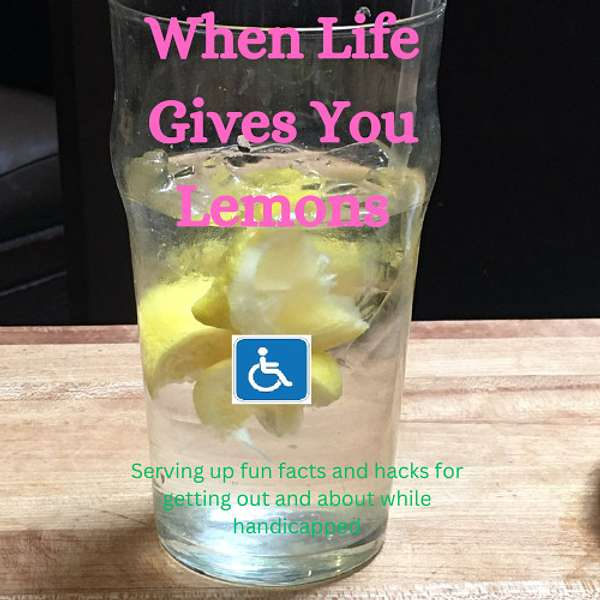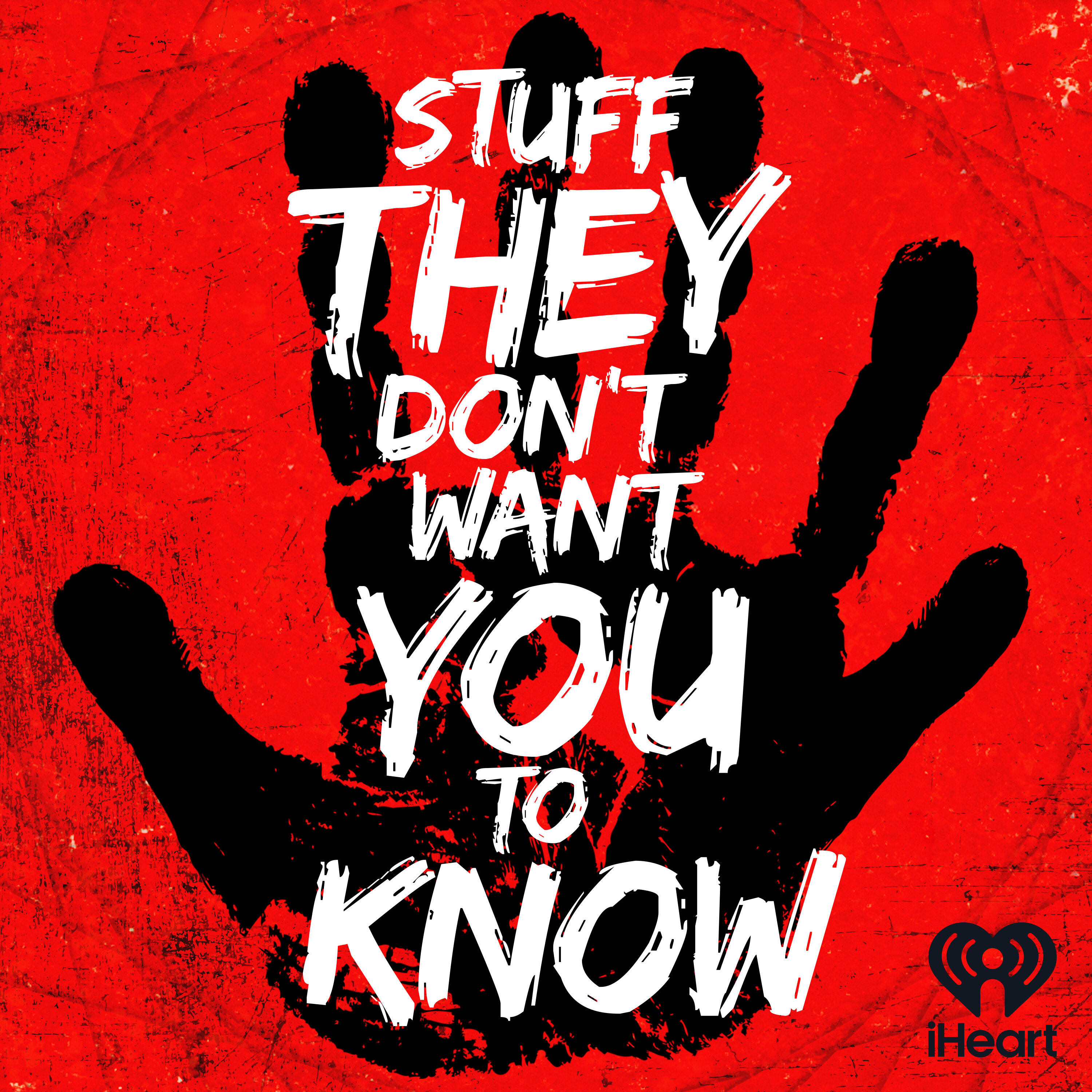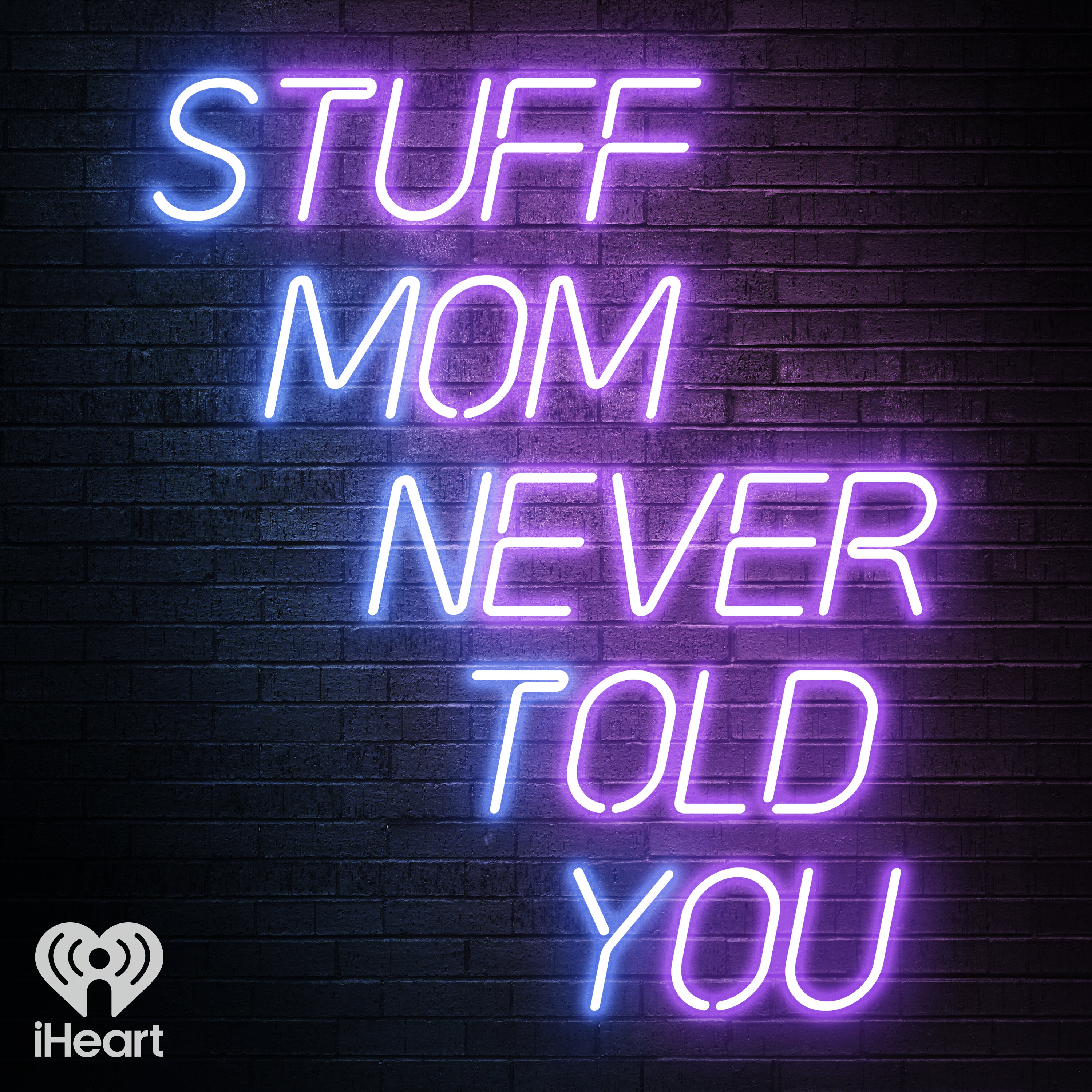
When Life Gives You Lemons
We do a bit of Research into handicapped travel issues and provide some solutions. Mobility, Hearing, Sight, Mental issues included. so far our episodes have included some information on Ataxia, Cerebral Palsy, Deafness, Dancing Sickness, Gulf War Syndrome, Long Covid and Wheelchairs. We are both Disability Advocates and realize there are too many diseases and conditions to cover and try to discuss the most common problems disabled people face and spread some awareness of disabled issues non-disabled people are unaware of.
CORRECTION
On a Previous episode I described how to enter our End Of Season contest. Step 1 click on the support our show link. Step 1 we require a one time payment (This has changed during our season) of $3. Step 3 (get you back to a one time payment) click on the $3 Subscription button. The following business day cancel the subscription (if you do it same day your bank may start thinking FRAUD. Step 4 Your done. Thanks for entering and "may the odds be forever in your favor",
When Life Gives You Lemons
Beyond Diagnosis: The Evolution of Modern Cancer Care
Cancer treatments have evolved dramatically from automatic death sentences in the 1970s to manageable conditions where patients can live for additional years or even decades with proper care.
• Ruth's experience with her oncology team demonstrates the importance of having specialists who collaborate effectively with primary care physicians
• Different types of cancer treatments include surgery, chemotherapy, radiation, immunotherapy, targeted therapy, hormone therapy, and stem cell transplants
• Immunotherapy represents a breakthrough approach that helps the immune system recognize and fight cancer cells naturally
• Cancer can affect virtually any organ or system in the body, with varying risk factors and survival rates
• Five-year survival rates for localized cancers range from 36% for brain cancer to nearly 49% for esophageal cancer
• Recent advancements include improved treatments for breast cancer, genetic tools for pancreatic cancer, and CAR-T cell therapy
• Prevention strategies include avoiding tobacco, eating a healthy diet, staying physically active, protecting yourself from sun exposure, and getting regular screenings
• Regular healthcare check-ups are crucial for early detection, especially in areas with limited access to medical facilities
Remember to protect yourself from UV rays even on cloudy days - they still penetrate cloud cover and can cause sunburn!
Soundstripe.
Palmi:Welcome to our podcast. When life gives you lemons, I'm Kevin and I'm Palmi.
Kevin:We consider ourselves disability advocates and intend to spotlight some disability issues and things we find interesting that we frequently encounter when we're out and about. Also some history on disability that we find interesting.
Palmi:Welcome back everybody. This is Kevin. Welcome Palmi.
Kevin:Hey Kevin.
Palmi:And today we're just basically talking about the interview and going a little bit more deeper about cancer and cancer treatment, correct?
Kevin:Yeah, that's what we're doing. Okay, we had a nice visit with Ruth and Byrl. Both she's looking so much better than when we were there last time. Yeah, I think she's feeling better. Yeah, she said she was.
Palmi:One thing that she brought out during the interview is that she has a team of oncologists and oncology-related specialists that talk to her primary care physician and decide what course of treatment is better for her. And once her primary care physician is very good at explaining things the way she understands so the doctors can all talk, doctors speak. Then he'll kind of break it down for her and explain what's going on, and she really appreciates that sort of contact with her medical team.
Kevin:Yeah, she really trusts her team.
Palmi:She really likes her primary care physician, who she's seen for a number of years. She has not had a chance to spend years and years meeting her oncology team.
Kevin:In fact I think this is her second one. She had one and he moved away or retired, and then the new one came on and he took it over after this one left. But she's actually very has really adapted to the new one also.
Palmi:You know, one of the things she mentioned is that all her oncology team was basically treated. It consists of people who are either at Vanderbilt, Vanderbilt yeah. Vanderbilt University.
Kevin:They just put a new Vanderbilt site in at Cookville Right .
Palmi:The entire staff at our oncology department is either trained by vanderbilt or falls at a vanderbilt doctorology? Yeah, of the way they do things, the way the charts, etc.
Kevin:Yeah, they're right on. I've gone to, I think, two uh treatments with her and they're right on it. I've gone to, I think, two treatments with her and they're right on it. You know they are very attentive, they know her, you know you feel welcome when you walk in. You know she's had a few incidents where strange things have happened and she's called and you know right away they were right on it and took immediate care to her, for her. So I think that's amazing.
Kevin:I do too for those of us better when you're four hours away and you can't get there as quickly as you'd like to be.
Palmi:You know, you know I graduated high school in 1978, basically people who got cancer back in that days.
Kevin:Didn't survive.
Palmi:Were usually just automatically assumed that was a death sentence.
Kevin:Yeah yeah. She has a friend who, as she mentioned in her interview, I think has been doing this for, I think, 10 years.
Palmi:Yeah.
Kevin:I mean it's a pain in the butt to do, but it's allowed her to live for an additional 10 years. And she mentioned this immune therapy, which I had never heard before, which helps the immune system fight the cancer, because we just mentioned in the previous interview our episode that cancer tries to evade the immune system.
Palmi:So it's something that enriches your immune system to try to fight the cancer Right which is basically the first step in what you go with for example, with the COVID vaccine that was an mRNA-type vaccine was to identify the cancer markers and specifically what the cancer cells look and act like. They can impart that information into the body's immune system and the cells can do a better job of targeting the cancer.
Kevin:Whereas before it was just well to kill the cancer.
Palmi:we've got to basically kill everything until the cancer is there, no more. But here they want to kill a little bit of cancer and stop it from spreading, and then let the immune system perhaps get clued into what's going on and continue the fight. You don't have all those noxious toxic chemicals in your system, you don't have the effects of radiation in your body. You just kind of let it happen naturally, so to speak.
Kevin:So, depending on the type of cancer, there's several kinds of treatments that are available, Depending on the type, the stage and the individual's health factors. The most common approaches, which is surgery, to remove the cancerous tumor or the affected tissue. There's chemotherapy, which is drugs to kill or slow the growth of the cancer cells. There's radiation, which targets the cancer cell with high energy radiation, basically trying to kill it. Immune therapy, which we just talked about, which helps the immune system fight the cancer. There's targeted therapy, which focuses specific molecules involved in the cancer growth. There's hormone therapy, which blocks or remove hormones that fuel certain cancers, like you were just talking about. There's stem cell transplants replaces damaged bone marrow with healthy cells. And then there's hypothermia and photodynamic therapy.
Kevin:Which uses heat and light-activated drugs to destroy cancer cells. Sometimes, treatments are often combined for the best results, and cancer comes in many forms and there are several different kinds of cancers, so let's go through a few that are listed.
Palmi:Okay, we're going to roll off the list, but the rule of thumb, the list, but the rule of thumb. Any organ in your body can be a source of cancer cells. Not just organs, blood Okay, blood also is. Again, we go back to those two types we talked about last time. Leukemia is basically cancer of the blood and lymphoma is basically cancer cells transported by your lymphatic system.
Kevin:Okay, so I'll do one, you do one. How's that?
Palmi:Okay.
Kevin:So breast cancer the most commonly diagnosed cancer in the United States? I didn't know that.
Palmi:I think one of the reasons that makes it so is you can actually carry a gene that makes you more susceptible to breast cancer.
Kevin:Really, is that correct? Yeah, you can carry the gene, I know that, but you think it's based on our genetics?
Palmi:then I think, so. I don't think it means if you have that gene you're going to have breast cancer. I know you're more susceptible, yeah. It just means you're more likely than average to get, say, breast cancer. That may or may not be the case with other types of cancer.
Kevin:I just plain don't know the answer to that, and I believe that's men or women, men or women.
Palmi:Breast cancer does affect both sexes. Yes, both sexes. Yes, which I did not know until I started reading stuff during the research of this process, yep. The next on the list is chemotherapy.
Kevin:No no.
Palmi:Liver lung cancer. Okay, I'm looking at the wrong spot. Obviously Lung cancer, which is a leading cause of cancer-related deaths. One of the reasons that that is way up there is previous generations have spent so many years smoking, which is a leading contributor to lung cancer Right which we didn't know for a long time. Other breathing diseases like COPD, epizema and such.
Kevin:Yeah, prostate cancer is common among men. It's often slow growing and it wasn't tested for for a long time.
Palmi:Do women even have prostates? So that's why she legally related to men Right Okay, gotcha, okay Okay. Colorectal cancer. I imagine that can be either sex Right. And a lot of the things you see a lot of TV ads for colonoscopy.
Kevin:That's why you get your colonoscopy.
Palmi:And colic or things that allow you to catch colon cancer before it's obvious, before it's hurting you.
Kevin:I think there's a connection between hot dogs, that type of food, lunch meats and stuff like that.
Palmi:Processed meats.
Kevin:Processed foods. Yeah, so I think there's a connection there. They say not to eat that. For that connection.
Palmi:I thought that was just a general health thing.
Kevin:But I think it's more related to the colon and the rectum cancer.
Palmi:Which kind of makes sense, I guess?
Kevin:Melanoma I lost my place too sorry. A melanoma a serious form of skin cancer, and now that we're having more and more of our ozone depleted, I think that's becoming more of a serious issue.
Palmi:Okay, that's fake news Pommy.
Kevin:Whatever?
Palmi:Whole ozone layer is closing in, healing itself.
Kevin:Okay.
Palmi:Well.
Kevin:I know three people in my volleyball group that's had skin cancer removed recently, so I know it's a big thing.
Palmi:Yeah, I know that every single time you go to the doctor and get, for example, a skin tag or a mole removed, they always tested to see if anything in that that was removed was cancerous. In years gone by, when I was younger, at least tanning in the sun was very, very popular Right which led to a lot of people not using any or very little sunscreen.
Kevin:When I was a kid, we used to use baby oil and sit out in the sun, which was like tanning yourself Anti-sunscreen yeah. It's like tanning a turkey beaching their based in a turkey. Yeah, okay, so the next one is give me other ultraviolet light wait, little little did we know, right.
Palmi:I think there's still people that do that, so one comment misconception about ultraviolet light and sunscreen is ultraviolet light penetrates clouds, so even if it's a cloudy day, wear your sunscreen.
Kevin:Yeah, I was just telling Kevin, I was planting our garden and it was completely cloudy, in fact there was almost rain clouds, and I was out there all day long and I was planting my plants and I came in and the top of my forehead of course, I didn't think to wear a hat because one. It was actually cool outside and I actually had a little bit of a sunburn on the top of my head and I never would have thought to have to put some lotion or sun tanning or sun protection out from it because it was so nice, you know, cool and no sun. It was actually a little rainy out but there definitely the rays coming through those rain clouds.
Palmi:And one other thing you should be aware of. It matters a lot where you live on the globe. Yeah, For example, when we lived in Hawaii, I could be outside for 15 minutes without sunscreen and I'm fried and I was like 10. Yeah, so I just thought I used to the Hawaiian tropic sun beat down on me. And being a Caucasian, I need that sunscreen yeah.
Kevin:Next one, Kev.
Palmi:Is it my turn? Yep Bladder cancer.
Kevin:So this is more common in older adults.
Palmi:Okay, so this is more common in older adults. Okay, I think that goes without saying, because just about everything affecting your bladder happens to you later in life all those toxins, collection of all those toxins forever and ever could be yeah non-hot, all those waste products, your battery, your body is get trying to get rid of rid of yeah, kind of makes sense go out through cesspit pits?
Kevin:yeah, non-hopkins. Lymphoma, a cancer of the lymph, uh, lymph, the lymphatic system, again, all those toxins toxins that's where they're stored in your body. Makes sense.
Palmi:And the next one is kidney cancer, which is basically the filter it catches those toxins separates it from your blood or lymphatic system and directs it into your urinary system.
Kevin:Right, I can never say that word. Andromedial cancer affects the lining of the uterus, which is what I had.
Palmi:And leukemia, which is a cancer of the blood as opposed to lymphoma. It's in your blood, not your lymphatic system, and that's the part that, unfortunately, I don't know about nowadays. But for the longest period of time, insurance companies would not cover it because the treatment for it was something they deemed experimental. Even though it was the only treatment for it, ie the bone marrow transplant and had been around for 10, 15 years successfully, they wouldn't cover the bone marrow transplant Again. I'm not sure why, but perhaps some of our listeners may have some more updated info on that, but there's such a pain, like it used to be here, that I just happened to grow up with.
Kevin:Yeah, I think they do now. So each type has a different risk factors, symptoms and treatment options. The survival rate are different for each kind of cancer and vary differently depending on the stage, diagnosis, the treatment options and overall health of the patient. Here are some five-year relative survival rates for localized cancers, meaning the cancers that are not spread beyond its original site and before we get into that, pommy.
Palmi:Let's talk about cancer markers. I think that was brought up during the interview. Basically, if you have cancer cells, your blood is going to show the white blood cells, basically cancer markers, and they can scan your blood. Again, this is nowadays I don't think this was like way back when we were first learning about cancer but they basically do a sample of your blood and they can tell whether or not you have cancer markers, ie cancer somewhere Perhaps, or they're not looking at. I've had a couple blood tests and the technician that reads out your blood tests will test always for cancer markers and then if there are cancer markers in your blood, your physician will bring that to your attention and perhaps suggest further testing to identify where and what type okay
Palmi:sorry to interrupt, but that's, and because I interrupted, let me throw this out there. Okay, bobby was talking about the percentages in survival rates. Again, I don't think this is strictly modern numbers. I think this is over a period of time, which may be, if you want to look at them, from year to year I've heard they're decreasing. The first one is esophageal cancer. Again, remember, our predecessors smoked a lot. They only smoked, but chewed tobacco. They had beefly tobacco, which can be a leading cause of cancer. And we'll, of course, having tobacco products, be it smoking or chewing or dipping, whatever affects your, basically your digestive system and perhaps produces some sort of cancer in that area or your respiratory system.
Kevin:And that's at 48.8%. Correct Pancreatic cancer, that's at 44.3%.
Palmi:Okay. I want to also point out that's basically pancreatic system. That's a lot to do with your renal system, so it might be why those are pretty high, though, I think. Yeah, I would like to think they're getting higher, but I'm not going to speculate on that.
Kevin:Well, this is just if it hasn't spread and it's based on a five-year relative rating.
Palmi:Right.
Kevin:Next one is liver cancer. At 37.3.
Palmi:Which sounds really low, but anytime you have cancer cells in your liver. You can count on your circulatory system, which is filtered by your liver. I think it spreads fast there too, yeah it gets into your blood system, it is carried to different parts of your body. That may be why that's a bit lower. The next one is brain cancer 36%. And that, I'm guessing, is lower, because basically your brain controls every organ in your body.
Kevin:Yeah, these rates tend to be higher for For cancers detective early and treated efficiently. So cancer survival rates depend on several factors, including the cancer type, the stage the earlier the stages found, the higher rating and the less advanced the cancer. Also, the treatment options. What options are available to you um the age or overall health? Your mom was lucky. She is 84 82, but she's in really she was in really good health you know very active, very active for age, genetics and biological factors.
Kevin:Lifestyles meaning diet, exercise, whether you smoke or alcohol consumption, healthcare access.
Palmi:Also including the lifestyles is basically remaining active even though you're stuck in some places in your wheelchair, or perhaps using a walker or other mobility aid. For most types, there is exercises that have been adapted to a seated position. That's for those of us that could not stand to do calisthenics without causing all kinds of chaos in our body and those of us that are showing our age to speak and just can't get up and walk around the way they used to. Sorry, dear friend but, I, thought that was worth noting.
Kevin:It also depends on the tumor characteristics the size, the growth rate, the molecule makeup of the tumor.
Kevin:It all depends on that.
Kevin:I mean, each cancer is different.
Kevin:That's what your mom kind of stressed in the interview, that how they take each person individually and make a plan specific to them based on their own cancer, how they go in and take a blood test every time that she comes in and then they decide you know exactly how they're going to treat it at that treatment date. You know she doesn't have there. She's given a plan but it is executed based on how she's doing that day and based all the way down to whether she has family coming in or how she's feeling or you know. So it's very personalized to how she, um, how the person is actually doing. So there's some there's been exciting advancements in cancer treatments that have improved the survival ratings, specifically for breast cancer. The mortality rate has declined and that's because the study found that the breast cancer deaths among women aged 20 to 24 significantly dropped between 2010 and 2020, and, with Mark, declined after 2016,. And it's because of all the advancements they've done specifically for breast cancer. There's a lot of research out there right now for breast cancer.
Palmi:Yeah, one thing I want to interject before I read the next one is that, in general, okay, I know what to do for a rare disease, but I don't know how to do this for a non-rare disease, For example, cancer is that we're talking? In my case, it's a very rare disease. They have their own databases. You can sign up for clinical studies. During the research for this project, One of the things that's very important for cancer researchers is that they have patients that are continuing to sign up for clinical studies. Now, in my case, a lot of these are just filling out a survey or talking to a clinician at a certain university. Some of them actually have you go to that university that's conducting the study, All that stuff. It's very upfront and clear. I don't know how you go about it.
Palmi:I don't know how you go about it. I suggest you check and do cancer-related support groups et cetera.
Kevin:Yeah, makes sense. There's a lot of them out there, A lot of local stuff too. So we're at the generic Genetic tools for pancreatic cancer.
Palmi:Yeah, okay again. Researchers in Japan have developed a predictive model that combines tumor marker readings. Those are the markers I talked about earlier In the blood, yeah, in your blood With genetic information to better determine if you have genetic factors that contribute to that sort of cancer.
Kevin:No, to determine which patients would benefit from surgery. Right from surgery.
Palmi:Right. That's because, as with cancers basically, as Palmby talked about earlier the treatment options often involve surgery, and surgeons, as a general rule, err on the side of caution. If you have something like pancreatic cancer, you'd much rather remove more of your pancreas as to be sure that they're getting all the cancer cells. You can't live without a pancreas, but depending on how much it basically is going to affect how your lifestyle is affected by that surgery Right.
Kevin:Advancements in lung cancer treatments have targeted therapies and autoimmunes with significant improved survival ratings for non-small cell lung cancer, and with new antibody drugs in conjunction with, has showed promising results okay when you hear this one.
Palmi:It's called CAR-T cell therapy. It's innovative. I hate when they use words to say new or experimental or innovative, because that just means to me you're probably going to have problems with insurance covering it. But again, people who have had experience dealing with some of these therapies be sure you give us a lowdown on how it works nowadays, because that might just be something that's ingrained to be, with having problems with bone marrow transplants and such cancer cells leading to a higher emission rate for certain types of lymphoma and leukemia. These breakthroughs are helping patients live longer and improving their quality of life.
Kevin:So now that we've scared the living crap out of everybody, To put it mildly yes, so what do we do to try to keep cancer away? So these are some suggestions that this website had to try to say keep cancer at bay. There's nothing you can do outright, because there's a lot of there's a lot of pseudoscience that goes around. Well, there's a lot of environmental issues that we can't control, that are not within our.
Palmi:Well, not only that, if you remember, don't go back for certain issues like does fast food contribute to cancer?
Kevin:Yeah Well, there's certain things we do know that contribute to cancer, like smoking. Don't smoke. Don't chew, don't what is the other stuff Chews?
Palmi:Again your diet processed foods.
Kevin:Yeah, eat a healthy diet. Focus on fruits, vegetables, whole grains, lean proteins, while eliminating processed foods and red meats. Stay physically active A regular exercise program to maintain healthy weights and lower the risk of several types of cancer. Protect yourself from the sun. Use sunscreen. Wear protective clothing. Avoid excessive sun exposure to reduce the risk of skin cancer. Limit your alcohol consumption. Excess alcohol intake increases the risk of cancers such as breast, liver, colon. Get vaccinations. Vaccinations for HPV and hepatitis B can prevent cancers caused by viruses. Regular screenings early detection through screenings like mammograms, colonoscopies, pap tests can catch cancer in its earliest stages. Manage stress and sleep well. Chronic stress and poor sleep can weaken the immune system and make the body more vulnerable. These are just things that you're supposed to do normally, nothing in excess. I think we've heard these same things for every part of staying healthy.
Palmi:And basically a lot of that can be augmented by implementing regular health care, which is it's a issue in the United States. Other countries that have a more socialized medicine program do not get affected by it. The US people tend to seek medical care only when they know something is wrong well, it depends on your personality that depends on a lot on your personality. Some are seeking a doctor every time you turn around, you have two doctors yeah, and medical care itself, for example, it's usually a lot easier in urban areas to swing by and have a checkup at your doctor's place.
Kevin:I know Kevin doesn't tend to do it because it's a pain in the butt to get loaded up in the car In rural areas.
Kevin:yeah, it's a pain in the butt to get loaded up in the car and the ruler is yeah, it's not so, or I mean, if you're in the city and you don't have transportation, that would be a pain, so, or you know other issues like it. When it rains, it's hard to get in and out of vehicles and stuff like that, so, but it's just always better to know to find something early than to wait and have it get too big to be out of your hands and be worse, have the prognosis be worse? Well, I think we have scared everybody to death. We've done our job.
Palmi:Well, let us know in your comments and fan mail folks, Do we scare you sufficiently?
Kevin:But, when life gives you lemons. What do we say? Make lemonade, that's right.
Palmi:Which is bad for you if you're diabetic. Use monk fruit yeah yeah, most of the uh uh. Okay, my experience with artificial sweeteners is kind of prejudiced among fruits.
Kevin:Been around for what thousands of years? Yeah, it's a natural sweetener, it's natural.
Palmi:It's like stevia in that it's natural. It's not gonna increase your chances of brain cancer any type of cancer. It's. You know, like I said, cake. We had basically in the Western world artificial sweeteners since Roma times. Does anyone know what the artificial sweetener was that Romans used? Do you know that?
Kevin:I have no idea lead really, saccharin is a lot better than lead that's why, when you talk, about lead. That's why you know when you talk about like a lead paint that's why kids eat it, because it tastes a little bit sweet. Oh really, I didn't know that.
Palmi:I'm sure there's a lot of other flavors that are going on, but they just hit that sweet note and say okay this is something I should eat.
Kevin:No wonder they continue eating it. Huh yeah, I guess.
Palmi:Yeah, again, we're not talking about kids that chew on your holes. We're talking about kids that eat old, flaking pink chips. Does that make sense? Yep chips.
Kevin:Does that make sense?
Palmi:Yep, I have yet to see a kid choose way through a wall. Is that something you're familiar with?
Kevin:Never, never heard that.
Palmi:Okay, well, until next time. I'll see you later, folks.
Kevin:Bye now.
Palmi:Until next episode, take those lemons and make your own lemonade.
Podcasts we love
Check out these other fine podcasts recommended by us, not an algorithm.

When Life Gives You Lemons
Kevin & Palmi Henry
Stuff They Don't Want You To Know
iHeartPodcasts
Stuff Mom Never Told You
iHeartPodcasts
Stuff You Missed in History Class
iHeartPodcasts
Planet Money
NPR
Ridiculous History
iHeartPodcasts
The Way I Heard It with Mike Rowe
The Way I Heard It with Mike Rowe




